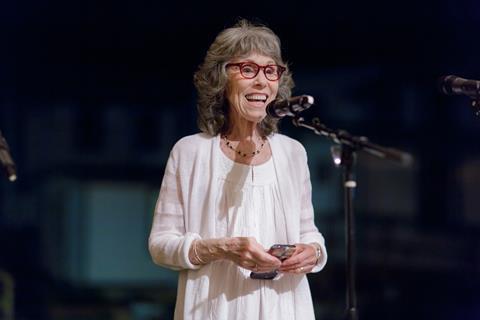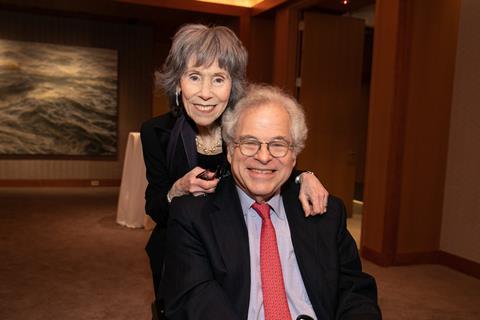Adam Hockman interviews the Perlman Music Program founder Toby Perlman on creating an ideal and safe environment for string students to thrive

Toby Perlman, founder of the Perlman Music Program (PMP), has spent her life in the arts as a musician, teacher, and programme director. She founded PMP in the summer of 1994 as a supportive environment for young artists from around the world. For Toby, PMP is about meeting every child’s needs, respecting and trusting them, and creating an environment that prizes connection over competition.
In this interview, Toby shares her teaching philosophy and thoughts on music education, as well as some of the lessons she and her colleagues have learnt over the past 30 years. Her shared insights are applicable to teachers and programmes interested in nurturing the musicianship and personal potential of young artists.
How did your personal experience as a student and child influence your design of the Perlman Music Program?
TP: I had a real struggle in school. I wasn’t good at it at all. I struggled to add and subtract, sightread, and so on. I always thought school could be better in some way. So, the idea of running a school myself has been cooking for a long time.
I had experienced festivals that were too big, and the last thing I wanted was to have a large festival. One day, I was at a community meeting where someone mentioned the idea of running a music festival or a school. Without missing a beat, I said, ’You want a school? I can do that.’ And that was it. That was in April and we opened in August for two weeks. All I needed was an excuse—the idea for how I would run the programme was already in my head.
In an interview with Dmitri Berlinsky, Toby described the importance of her training with Dorothy DeLay, who modeled a way of teaching that truly met what Toby needed as a student. Toby’s experiences with Ms. DeLay influenced her design of PMP.
[She] was perfect for me, because her teaching was full of kindness and sweetness. It wasn’t that she was not demanding—of course she was demanding—but she was really sensitive and nice. I wasn’t a star. I needed somebody to be sensitive and nice and she was that person. I was very lucky.
What was most important to you when creating the culture at Perlman Music Program?
TP: It was really important to me that we create a safe space for students to learn. The student is always right. The teacher is usually wrong. Maybe the child can’t articulate exactly what’s going on with them, but we look for how we need to adjust to help them. We approach everything as a team. Everyone on faculty has the same point of view: How can we help this child? What’s really going on here? It’s not easy. After all, we have a tremendous responsibility, but we are all on the same wavelength. Nobody’s blaming the child. We’re looking for a way to help. Some of these children have enormous pressure on them, and we try to help them the best we can.
What structures does PMP have in place to promote student success?
TP: I’ll mention three that are very important for the success of our programme, faculty, and students.
- Programme size and check-ins. First, the size of our programme allows us to give every child the attention they need. We have eight cellos, eight violas, and sixteen fiddles. With that size, we can see everything that happens. You see at lunchtime if a student has had a rough morning, we can read their faces. A small programme allows us to be on their side and help them. We want them to be successful.
- Practice. We have the opposite problem of most programmes. We have to stop our students from practicing because they overwork themselves. Students practice for four 50-minute blocks each day. In the afternoon, they have lessons, chamber coachings, rehearsals, and recreational activities. We try to make a big deal about this: no playing in pain, and we must exercise every day. It’s very important for children to learn what the limits are in terms of what they can expect from their bodies. How much trouble they can get in if they abuse their bodies. Structured practice helps them learn that they can’t practise for eight hours a day, it’s just not OK in the long run.
- Stretching. We require students to stretch as a group every day with a physical therapist and pilates instructor. Students learn how to rest, stretch, and minimise performance-related injuries.

What kind of community of students and alumni have you built?
TP: We have such a wonderful community of alumni—all seven or eight hundred of them! When we reach out to them, they get back to us right away. They’re friends with one another and welcoming to PMP peers they’ve never met.
Do you facilitate those connections?
TP: Yes, we really work at it. The key is making the community, not just talking about it. We have activities twelve months of the year. For example, we might have an opera project in the middle of the winter in which a board member sponsors seats for an opera performance in NYC. We reach out to see who wants to go, and everybody wants to go! A group of us will meet up for dinner, discuss the opera, and then go see it together.
Another example is our Sunday Salons, which happen with a certain amount of frequency. Everyone is invited. People move from room to room and sight-read chamber music together, and then we have a family-style dinner.
Music is almost an excuse for community building. And what is it about this community? It’s the feeling of being safe. You are with your people.
During her studies at The Juilliard School with Ivan Galamian and Dorothy DeLay, Toby Perlman had a dream of the perfect summer programme for gifted students of the violin, viola, cello, and piano. Her dream became a reality in 1994 when she founded The Perlman Music Program. As founder and president of The Perlman Music Program, Toby continues to strive to help talented young musicians mature as artists, and as well-rounded individuals in a noncompetitive, creative, and supportive environment. Toby is the wife of reigning virtuoso of the violin, Itzhak Perlman. They have five children and fourteen grandchildren.
The number one source for playing and teaching books, guides, CDs, calendars and back issues of the magazine.
In The Best of Technique you’ll discover the top playing tips of the world’s leading string players and teachers. It’s packed full of exercises for students, plus examples from the standard repertoire to show you how to integrate the technique into your playing.
The Strad’s Masterclass series brings together the finest string players with some of the greatest string works ever written. Always one of our most popular sections, Masterclass has been an invaluable aid to aspiring soloists, chamber musicians and string teachers since the 1990s.
American collector David L. Fulton amassed one of the 20th century’s finest collections of stringed instruments. This year’s calendar pays tribute to some of these priceless treasures, including Yehudi Menuhin’s celebrated ‘Lord Wilton’ Guarneri, the Carlo Bergonzi once played by Fritz Kreisler, and four instruments by Antonio Stradivari.













































No comments yet